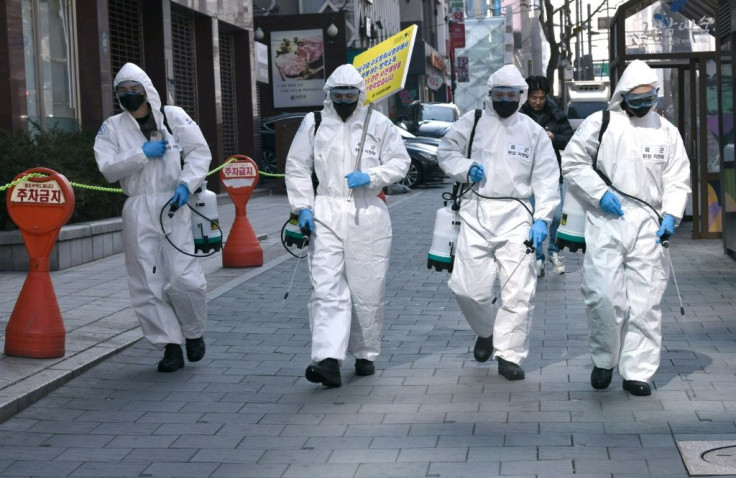Coronavirus Update, March 05: Here's What You Need To Know Today

Even as China seems to be succeeding in its efforts to contain the spread of the novel coronavirus, the pathogen seems to be breaking free in Italy and Japan, deepening concerns about its impact on the global economy.
More than 3,200 people, mostly in mainland China, have died of COVID-19 so far, and the number of infections globally has climbed to about 95,000 across more than 80 countries and territories.
News from the major disease clusters outside of China continued to be bleak. Together, these countries -- South Korea, Italy, Iran, and Japan -- account for 80% of the infections outside of China.
South Korea: Confirmed coronavirus case in South Korea rose above the 6,000 mark, with 35 deaths reported so far. 760 new cases and 3 additional deaths were reported Thursday. About half of the total infections are linked to a branch of the Shincheonji religious group.
President Moon Jae-in's government has proposed an extra budget of about $9.8 billion to respond to the virus and to help its recovery. The government also halted the export of face masks. The city of Gyeongsan was declared a “special care zone,” the third city to be so designated.
Iran: In Iran, the virus has spread to nearly all its promises and killed 92 people so far. But there are fears that the secretive regime is hiding the actual number of infections. Its release of 54,000 prisoners point to the scale of infection being much larger than the government is willing to acknowledge. Even members of the country's political leadership are among those infected. The World Health Organization (WHO) said Iran will open special coronavirus hospitals in all provinces.
The epicenter of the outbreak is the Shiite holy city of Qom, which along with capital Tehran are the worst-hit.
Italy: The number of confirmed cases in Italy jumped to 3,089, while 107 people have died so far from the infection. The country has closed all schools and universities and declared a "red zone" in the north.
Japan: In Japan, the number of infections topped 1,000 Wednesday including 706 people who were aboard the Diamond Princess cruise ship.
In China, the epicenter of the outbreak, the government is trying to prevent the virus from being brought back to the country; it has allocated $16 billion for the prevention efforts. Beijing also honored the whistleblower doctor Li Wenliang, who died of the virus after trying to sound alarm about the infection when it was beginning to spread. The local police had warned him for "making false comments."
India, the second-most populous nation after China, reported a spike in cases to 29. It has reported no deaths so far but has suspended granting visas to citizens from Italy, Iran, South Korea, and Japan. A group of Italian tourists in the country have been quarantined after testing positive, and some 200-odd Indians are believed to have come in contact with them, raising worries about an outbreak.
In France, the number of COVID-19 infections jumped to 285, while Spain has reported 219 cases and two deaths. The number of confirmed coronavirus cases in Germany rose to 158.
Economic worries deepen: The virus' continued spread has deepened its economic impact on the global economy. The Dow Jones industrial average futures slipped more than 400 points, indicating a negative opening.
With oil demand weakening and prices under pressure, OPEC ministers are expected to approve a large production cut Thursday.
The International Monetary Fund (IMF) announced a $50 billion aid package Wednesday for low-income and emerging market countries to combat the impact of the coronavirus. The Democratic-controlled House passed an $8.3 billion measure to combat the virus' impact.
United Airlines has cut domestic and international flights, while JetBlue cut its capacity by 5%. The International Air Transport Association said global passenger growth for January 2020 was only 2.4% from a year ago, its slowest in nearly a decade. Major U.S. airlines are suspending or waiving certain changes and rebooking fees.
British regional airline Flybe, the biggest operator of domestic flights in the country, declared bankruptcy.
Tech giants Apple, Google and Microsoft are seeking to move at least some of the production away from China. Several companies including Twitter, Apple and Goldman Sachs have restricted travel, and many more are expected to follow.
Amazon has recommended its Seattle employees work from home until the end of the month. Facebook is closing one of its Seattle offices after a contractor who worked there caught the infection.
Netflix pulled out of South by Southwest (SXSW) conference; Facebook had done so earlier. MGM and Universal have postponed the release of the latest James Bond movie.
Starbucks said it is temporarily suspending the use of personal cups and tumblers at its stores to help prevent the spread of coronavirus.
Infections continue to rise in U.S.: The number of infections in the U.S. has continued to rise, with 160 cases reported so far. But Vice President Mike Pence, who is spearheading the U.S. response to the coronavirus outbreak has said the risk to the American public of contracting the virus "remains low."
Ten of the 11 fatalities in the U.S. are in Washington state; the eleventh one is in California. The two states are among the worst-hit. Washington has at least 37 cases and California at least 53. Texas and New Jersey have reported the first presumptive coronavirus cases.
10 crew members and 11 passengers of a cruise ship off the coast of California, the Grand Princess, have shown virus symptoms. The ship is being held at sea.
New York's Mount Vernon school district said it will close all schools and offices until March 9.
Multiple U.S. military branches are screening new recruits for the coronavirus as part of a sweeping effort to prevent the virus from spreading among the armed forces.
© Copyright IBTimes 2024. All rights reserved.





















